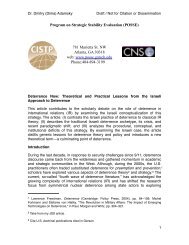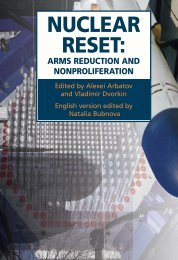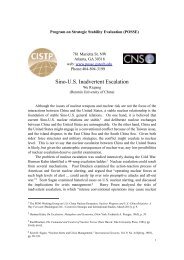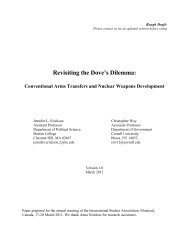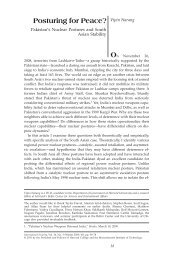- Page 1 and 2:
Visit our website for other free pu
- Page 3 and 4:
***** Comments pertaining to this r
- Page 5 and 6:
6. Aspects of the Current Russian P
- Page 7 and 8:
21. Arms Control after START ......
- Page 9 and 10:
this incredible amount of destructi
- Page 11 and 12:
hundreds of U.S. weapons (a
- Page 14 and 15:
TACTICAL NUCLEAR WEAPONS AND <stron
- Page 16 and 17:
Security was an additional problem.
- Page 18 and 19:
embraced lessons learned from the 1
- Page 20:
I learned here of some of the deep
- Page 24 and 25:
CHAPTER 1 THE HISTORICAL CONTEXT Ri
- Page 26 and 27:
as just another kind of military op
- Page 28 and 29:
it, the Allies were unlikely to agr
- Page 30 and 31:
• Assets for future arms control
- Page 32 and 33:
ments are dissimilar. Whereas Europ
- Page 34 and 35:
CHAPTER 2 TACTICAL NUCLEAR WEAPONS
- Page 36 and 37:
ombs in Europe as strategic weapons
- Page 38 and 39:
experiences of war, in a less moral
- Page 40 and 41:
Strangelovian image for NAT
- Page 42 and 43:
II. 1953-1963. U.S. STRATEGIC SUPER
- Page 44 and 45:
• For what political purposes mig
- Page 46 and 47:
widely heralded move to flexible re
- Page 48 and 49:
clear sentiment for the Alliance <s
- Page 50 and 51:
Nevertheless, Germany underst<stron
- Page 52 and 53:
first in order to break up his forc
- Page 54 and 55:
saw Pact lines to interdict strateg
- Page 56 and 57:
The Democratic People’s Republic
- Page 58 and 59:
given release authority by the Sovi
- Page 60 and 61:
III. 1963-1967. EMERGING DOUBTS CON
- Page 62 and 63:
esponse: without it, the Allies wer
- Page 64 and 65:
ous arms control groups argue that
- Page 66 and 67:
Why Did NATO Keep
- Page 68 and 69:
France were equipped with nuclear w
- Page 70 and 71:
slowly changing deterrence ethos wa
- Page 72 and 73:
through widespread protests, openly
- Page 74 and 75:
although it decided that the remain
- Page 76 and 77:
e concealed by the regular annual <
- Page 78 and 79:
However, concerned by the post-Viet
- Page 80 and 81:
ously create a public and</
- Page 82 and 83:
ers have repeatedly reemphasized th
- Page 84 and 85:
judged to generate (but which may n
- Page 86 and 87:
5. “The position we have reached
- Page 88 and 89:
24. Marc Trachtenberg, A Constructe
- Page 90 and 91:
49. Catherine McArdle Kelleher, “
- Page 92 and 93:
76. Joseph F. Pilat and</st
- Page 94 and 95:
100. Corroborated by Catherine Kell
- Page 96 and 97:
CHAPTER 3 U.S. NUCLEAR WEAPONS POLI
- Page 98 and 99:
the North Atlantic Treaty Organizat
- Page 100 and 101:
delivery exercised a dominant influ
- Page 102 and 103:
conventional strength. 14 In the Pa
- Page 104 and 105:
the capability to employ such weapo
- Page 106 and 107:
ground-launched short-range nuclear
- Page 108 and 109:
curity policy in Asia, and<
- Page 110 and 111:
lies. 31 At the strategic a
- Page 112 and 113:
mediate postwar period. Washington
- Page 114 and 115:
ons throughout the Cold War <strong
- Page 116 and 117:
These shifts are the products both
- Page 118 and 119:
power and the prol
- Page 120 and 121:
7. Robert S. Norris et al., “Wher
- Page 122 and 123:
frey A. Larsen and
- Page 124 and 125:
near Central Europe and</st
- Page 126:
47. Available from armedservices.ho
- Page 130 and 131:
CHAPTER 4 RUSSIAN PERSPECTIVES ON T
- Page 132 and 133:
Russian Navy would be particularly
- Page 134 and 135:
ers to produce income from Russian
- Page 136 and 137:
3. These are the results of polls o
- Page 138 and 139:
TACTICAL NUCLEAR WEAPONS AND THE FE
- Page 140 and 141:
Russia’s anticipated spending of
- Page 142 and 143:
arms race was on, and</stro
- Page 144 and 145:
heads; and improve
- Page 146 and 147:
national security strategy. Current
- Page 148 and 149:
On April 23, 1999, Viktor Nikolaevi
- Page 150 and 151:
First of all, the word “obligatio
- Page 152 and 153:
By 2004, a young scholar, Aleksei F
- Page 154 and 155:
time, it seems to believe that, in
- Page 156 and 157:
ence as the chief factor that limit
- Page 158 and 159:
their modernization as a response.
- Page 160 and 161:
in areas affecting Russian national
- Page 162 and 163:
armed struggle at sea for the perio
- Page 164 and 165:
centric warfare. Citing both Chines
- Page 166 and 167:
tation to maintain security <strong
- Page 168 and 169:
PROSPECTS FOR A U.S.-RUSSIAN TREATY
- Page 170 and 171:
uild a missile defense system in so
- Page 172 and 173:
10. “Ktokhitree: Mir vstupil v er
- Page 174 and 175:
36. Sergei Karaganov “Global Zero
- Page 176 and 177:
CHAPTER 6 ASPECTS OF THE CURRENT RU
- Page 178 and 179:
NATO countries. Du
- Page 180 and 181:
allistic missile defense (BMD), <st
- Page 182 and 183:
Meanwhile, the factor of China (wit
- Page 184 and 185:
Today, in fact, only the nuclear um
- Page 186 and 187:
By the same logic, preventing a pot
- Page 188 and 189:
diminishes still further Russian in
- Page 190 and 191:
1989 —April 12 SHORT-RANGE NUCLEA
- Page 192 and 193:
where Russian interest is higher th
- Page 194 and 195:
6. Kozin, “Five obstacles.” 7.
- Page 196 and 197:
CHAPTER 7 INFLUENCES ON RUSSIAN POL
- Page 198 and 199:
general and its ow
- Page 200 and 201:
are show of unanimity from nearly a
- Page 202 and 203: ally; it is just that others are ac
- Page 204 and 205: to direct Russian toward multilater
- Page 206 and 207: armor, like T-62 tanks and<
- Page 208 and 209: Reducing Non-Strategic Nucl
- Page 210 and 211: The Russian inventory has been redu
- Page 212 and 213: Under present conditions, the range
- Page 214 and 215: Ws should be multilateral, with the
- Page 216 and 217: continue the practice of conducting
- Page 218 and 219: the General Staff Nikolai Makarov o
- Page 220 and 221: CHAPTER 8 RUSSIAN PERSPECTIVES ON N
- Page 222 and 223: Yet these concerns are most likely
- Page 224 and 225: Bush and Mikhail G
- Page 226 and 227: anyone’s guess. As mentioned abov
- Page 228 and 229: STRATEGY Russian NSNWs attracted in
- Page 230 and 231: lored damage” (zadannyi ushcherb)
- Page 232 and 233: intrigue pertaining to nuclear weap
- Page 234 and 235: eaching political, military, <stron
- Page 236 and 237: Inertia. The longer this position i
- Page 238 and 239: In a similar vein, the Foreign Mini
- Page 240 and 241: THE RUSSIAN NSNW POSITION: LIMITS A
- Page 242 and 243: tated to what it calls an “integr
- Page 244 and 245: ENDNOTES - CHAPTER 8 1. “Zayavlen
- Page 246 and 247: 13. The 12th Main Department of the
- Page 248: PART III EUROPEAN PERSPECTIVES 227
- Page 251: ope is illustrative of a more funda
- Page 256 and 257: CHAPTER 10 THE ROLE AND PLACE OF TA
- Page 258 and 259: positions, preoccupations,
- Page 260 and 261: cohesion and solid
- Page 262 and 263: ferred to by the now familiar term
- Page 264 and 265: The second track is an effort to de
- Page 266 and 267: The United States. The traditional
- Page 268 and 269: the nuclear discussions apply only
- Page 270 and 271: supported by other members. However
- Page 272 and 273: cerning its nuclear posture. On the
- Page 274 and 275: tial expert on the dangers of nucle
- Page 276: 8. This is reminiscent of the posit
- Page 279 and 280: a London or Paris perspective, thei
- Page 281 and 282: One of the most important factors w
- Page 283 and 284: mer Vice-Chairman of the Joint Chie
- Page 285 and 286: Armed Service Air and</stro
- Page 287 and 288: Nunn in 2007 and 2
- Page 289 and 290: that the debate on a nuclear-free w
- Page 291 and 292: modify the Alliance’s nuclear pos
- Page 293 and 294: years. Signs of progress include th
- Page 295 and 296: on a modified CFE regime an
- Page 297 and 298: 9. See Miles A. Pomper, William Pot
- Page 299 and 300: Paper, No. 7, Washington, DC: Arms
- Page 301 and 302: eventual elimination are considered
- Page 303 and 304:
In the post-bipolar international s
- Page 305 and 306:
levels of enthusiasm, most European
- Page 307 and 308:
DIFFERING THREAT ASSESSMENTS AND AL
- Page 309 and 310:
troops in 2008 and
- Page 311 and 312:
that NATO as a who
- Page 313 and 314:
distinction between tactical <stron
- Page 315 and 316:
12. Author’s interview with a sen
- Page 317 and 318:
19. NATO’s argum
- Page 319 and 320:
31. Valasek, p. 24. 32. Lukasz Kule
- Page 322 and 323:
CHAPTER 13 EUROPE, NATO</st
- Page 324 and 325:
not reached a clear consensus on wh
- Page 326 and 327:
In an environment in which there is
- Page 328 and 329:
ing of signals within the Alliance.
- Page 330 and 331:
NATO foreign minis
- Page 332 and 333:
mean that the strategic lan
- Page 334 and 335:
weapon holdings did not exceed 225
- Page 336 and 337:
attitude to how nuclear weapons wil
- Page 338 and 339:
ghanistan will also help to determi
- Page 340 and 341:
German territory. On the other h<st
- Page 342:
PART IV AMERICAN PERSPECTIVES 321
- Page 345 and 346:
siles and aircraft
- Page 347 and 348:
ment of U.S. nuclear weapons in Eur
- Page 349 and 350:
that these weapons still have a rol
- Page 351 and 352:
with nuclear weapons, and</
- Page 353 and 354:
homeland. The trad
- Page 355 and 356:
However, if the United States were
- Page 357 and 358:
(estimated, to be 150-200) of U.S.
- Page 359 and 360:
er-projection capabilities, <strong
- Page 361 and 362:
ventional weapons. Unlike the perce
- Page 363 and 364:
any U.S. NSNWs deployed or stored i
- Page 365 and 366:
ganizational changes in recent year
- Page 367 and 368:
It is unrealistic to believe, as so
- Page 369 and 370:
Prague agenda with its goal of glob
- Page 371 and 372:
has a different set of critical qua
- Page 373 and 374:
ENDNOTES - CHAPTER 15 1. Assistant
- Page 375 and 376:
15. Ibid., p. xii. 16. Ibid. 17. Ib
- Page 377 and 378:
Hans M. Kristensen, “Nucl
- Page 379 and 380:
52. See Jeffrey A. Larsen a
- Page 381 and 382:
Hence, whatever course the Allies s
- Page 383 and 384:
self from the conflict. Of course,
- Page 385 and 386:
arguments by and l
- Page 387 and 388:
cal to the later stages of this cam
- Page 389 and 390:
The fundamentals of Smart Defense a
- Page 391 and 392:
deterrence and def
- Page 393 and 394:
ENDNOTES - CHAPTER 16 1. These are
- Page 396 and 397:
CHAPTER 17 ROLE OF NUCLEAR WEAPONS
- Page 398 and 399:
Two of the greatest enduring threat
- Page 400 and 401:
a monkey to an altitude of 120 km (
- Page 402 and 403:
including a “dual capable” (nuc
- Page 404 and 405:
By the end of the Cold War, in 1991
- Page 406 and 407:
U.S. Focus and Int
- Page 408 and 409:
eset by conflict, deterrence seeks
- Page 410 and 411:
Command in 2010. H
- Page 412 and 413:
y arms control and
- Page 414 and 415:
into account the disparity between
- Page 416 and 417:
Furthermore, the United States <str
- Page 418 and 419:
table price human beings must pay t
- Page 420 and 421:
16. See www.tradereform.org/wp-cont
- Page 422:
PART V ARMS CONTROL AS AN OPTION 40
- Page 425 and 426:
ise as a vehicle for regulating <st
- Page 427 and 428:
arms control to address the perceiv
- Page 429 and 430:
posite discussion within the contex
- Page 432 and 433:
CHAPTER 19 ARMS CONTROL OPTIONS FOR
- Page 434 and 435:
U.S. AND RUSSIAN NON-STRATEGIC NUCL
- Page 436 and 437:
into the discussion is that it woul
- Page 438 and 439:
get missiles on NATO</stron
- Page 440 and 441:
ficials have announced a major 10-y
- Page 442 and 443:
the INF Treaty banned all INF missi
- Page 444 and 445:
Others have also suggested that tra
- Page 446 and 447:
ample of the latter, in 1991 Presid
- Page 448 and 449:
certain percentage, say 50 percent.
- Page 450 and 451:
heads. Nondeployed strategic warhea
- Page 452 and 453:
ily in Washington’s judgment, <st
- Page 454 and 455:
publican president is less clear at
- Page 456 and 457:
10. “Strategic Concept for the De
- Page 458 and 459:
CHAPTER 20 TACTICAL NUCLEAR WEAPONS
- Page 460 and 461:
Most of the attempted adaptation <s
- Page 462 and 463:
ight metric (and t
- Page 464 and 465:
weapons (NSNWs)? A look at the key
- Page 466 and 467:
other, has ever gained serious cons
- Page 468 and 469:
who occasionally address other thea
- Page 470 and 471:
most of the other parties. Russia
- Page 472 and 473:
security concerns and</stro
- Page 474 and 475:
objectives and out
- Page 476 and 477:
CHAPTER 21 ARMS CONTROL AFTER START
- Page 478 and 479:
withdrawal as part of a wider disen
- Page 480 and 481:
ience with the Anti-Ballistic Missi
- Page 482 and 483:
strengthening of first-strike stabi
- Page 484 and 485:
ons away from the territory of <str
- Page 486 and 487:
is the relationship between them th
- Page 488 and 489:
would have added credibility were i
- Page 490 and 491:
still making a substantial contribu
- Page 492 and 493:
tionship between transparency <stro
- Page 494 and 495:
NATO WILL SURVIVE
- Page 496:
As in the past, the most likely cau
- Page 499 and 500:
summit on the effective control of
- Page 501 and 502:
deployed to Europe to approximately
- Page 503 and 504:
NATO policymakers.
- Page 505 and 506:
One of the alliances, the Warsaw Pa
- Page 507 and 508:
Hungary, and Slova
- Page 509 and 510:
statement at the conclusion of the
- Page 511 and 512:
anti-ballistic missiles on Polish t
- Page 513 and 514:
Following the meeting of OSCE forei
- Page 515 and 516:
inform Russia of any significant ch
- Page 517 and 518:
are difficult to correlate complete
- Page 519 and 520:
West. President Obama noted such a
- Page 521 and 522:
ing agreements. It must also combin
- Page 523 and 524:
19. Ibid. 20. Lachowski, p. 5. 21.
- Page 526:
PART VI CONCLUSION 505
- Page 529 and 530:
that means. Today, this seems to be
- Page 531 and 532:
more prosaic level, the presence of
- Page 533 and 534:
fence and Foreign
- Page 535 and 536:
JEFFREY A. LARSEN is a Senior Scien
- Page 537 and 538:
GUY B. ROBERTS was until recently <
- Page 539:
U.S. ARMY WAR COLLEGE Major General



